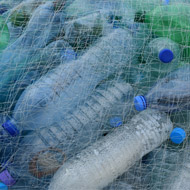
Levy could tackle ocean pollution and protect marine life
The government is to launch a call for evidence in 2018 seeking views on how the tax system and charges on single-use plastic items could reduce waste.
The move, announced by chancellor Philip Hammond, builds on the success of the existing plastic carrier bag charge. According to the Marine Conservation Society, the number plastic carrier bags found on UK beaches fell by almost 50 per cent between 2015 and 2016.
"The UK led the world on climate change agreements and is a pioneer in protecting marine environments. Now I want us to become a world leader in tackling the scourge of plastic, littering our planet and our oceans," said Hammond.
"We can’t keep our promise to the next generation to build an economy fit for the future unless we ensure our planet has a future.”
Animal welfare charities have welcomed the news, but were quick to point out that actions must be ambitious if they are to have any significant effect.
Dr Mike Barrett, WWF director of science and policy said: “Too often birds, fish, turtles and whales are found dead having eaten plastic. Plastic is suffocating our seas. There is no greater example of the havoc we have on the natural world.
“Any action to tackle single-use plastic is a good thing, but we must ensure any action is truly ambitious if we want to make the real difference needed to help save the planet.”
Dominic Jermey, director general of ZSL, said: “We are delighted to see a commitment from the UK Government to look for ways to discourage the use of single-use plastic. 700,000 plastic bottles are discarded every day in the UK alone, contributing to the pollution of our ocean and killing marine life.”
He added: “We stopped selling plastic water bottles at both ZSL London Zoo and ZSL Whipsnade Zoo in June last year, and our aim is to eradicate all single-use plastic from our catering operations by the end of 2017.”



 The BSAVA has opened submissions for the BSAVA Clinical Research Abstracts 2026.
The BSAVA has opened submissions for the BSAVA Clinical Research Abstracts 2026.